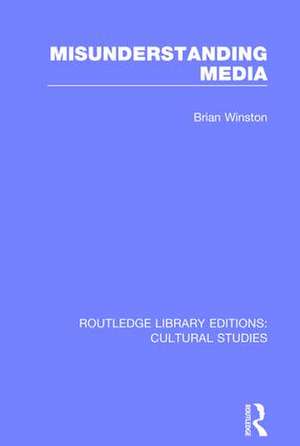Misunderstanding Media: Routledge Library Editions: Cultural Studies
Autor Brian Winstonen Limba Engleză Hardback – 2 sep 2016
| Toate formatele și edițiile | Preț | Express |
|---|---|---|
| Paperback (1) | 251.70 lei 43-57 zile | |
| Taylor & Francis – 27 mar 2018 | 251.70 lei 43-57 zile | |
| Hardback (1) | 658.14 lei 43-57 zile | |
| Taylor & Francis – 2 sep 2016 | 658.14 lei 43-57 zile |
Din seria Routledge Library Editions: Cultural Studies
-
 Preț: 287.12 lei
Preț: 287.12 lei -
 Preț: 351.66 lei
Preț: 351.66 lei -
 Preț: 350.68 lei
Preț: 350.68 lei -
 Preț: 347.80 lei
Preț: 347.80 lei -
 Preț: 243.98 lei
Preț: 243.98 lei -
 Preț: 251.70 lei
Preț: 251.70 lei -
 Preț: 243.98 lei
Preț: 243.98 lei - 34%
 Preț: 2796.16 lei
Preț: 2796.16 lei
Preț: 658.14 lei
Preț vechi: 988.12 lei
-33% Nou
Puncte Express: 987
Preț estimativ în valută:
125.95€ • 130.69$ • 105.27£
125.95€ • 130.69$ • 105.27£
Carte tipărită la comandă
Livrare economică 17-31 martie
Preluare comenzi: 021 569.72.76
Specificații
ISBN-13: 9781138699984
ISBN-10: 1138699985
Pagini: 434
Dimensiuni: 156 x 234 mm
Greutate: 0.75 kg
Ediția:1
Editura: Taylor & Francis
Colecția Routledge
Seria Routledge Library Editions: Cultural Studies
Locul publicării:Oxford, United Kingdom
ISBN-10: 1138699985
Pagini: 434
Dimensiuni: 156 x 234 mm
Greutate: 0.75 kg
Ediția:1
Editura: Taylor & Francis
Colecția Routledge
Seria Routledge Library Editions: Cultural Studies
Locul publicării:Oxford, United Kingdom
Public țintă
Postgraduate and UndergraduateCuprins
1. Breakages Limited 2. Fugitive Pictures 3. ‘Inventions for Casting Up Sums, Very Pretty’ 4. Digression – ‘The Most Remarkable Technology’ 5. Little Bird of Union and Understanding 6. Communicate by Word of Mouth
Descriere
The 1980s saw constant reports of an information revolution. This book, first published in 1986, challenges this view. It argues that the information revolution is an illusion, a rhetorical gambit, an expression of profound historical ignorance, and a movement dedicated to purveying misunderstanding and disseminating disinformation. In this historically based attack on the information revolution, Professor Winston takes a had look at the four central information technologies – telephones, television, computers and satellites. He describes how these technologies were created and diffused, showing that instead of revolution we just have ‘business as usual’. He formulates a ‘law’ of the suppression of radical potential – a law which states that new telecommunication technologies are introduced into society only insofar as their disruptive potential is contained. Despite the so-called information revolution, the major institutions of society remain unchanged, and most of us remain in total ignorance of the history of technology.
